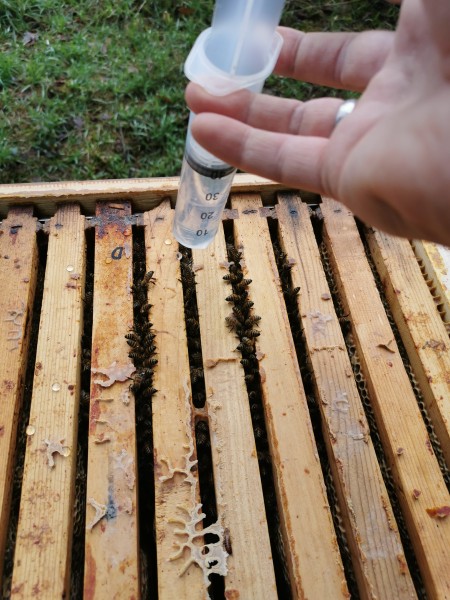At the winter solstice in December the bees begin their hard survival period. Before that the beekeeper has made his colonies ready for winter ("wintered") and the queen has started to lay eggs for the winter bees in September. These winter bees are very different from summer bees: they live longer, their biorhythm is slower to save energy and they are more resistant to low temperatures. Their task is to bring the queen through the winter in good health.
In December the seriousness of the situation begins for our Mierscher Beien. At the beginning or in the first third of December, depending on the weather, the queen stops laying eggs so that the colony is free of brood at the winter solstice. In the cold temperatures of the winter, the population has already shrunk considerably. Now the remaining bees have to feed the queen and warm her up in a so-called winter grape until she starts laying eggs for a new brood at the end of December (triggered by the weather and the position of the sun).
The beekeeper uses this brood gap to treat the bees one last time in the year against the bee's biggest modern enemy, the varroa mite. Oxalic acid is used, which the beekeepers do not really like, but which is relatively harmless for the bees in concentration and effect. Against the Varroa however an effective poison, which the beekeeper can determine in the days after the treatment under the colony, on the hive soil. The oxalic acid is mixed with fine sugar, which acts as a glue for the varroa poison on the bees, which come into contact with the acid when the bees climb the hive and die from it. Then this solution is carefully dripped on the bees, when the beekeeper tries to sprinkle as many Mierscher bees as possible in the grape in order to maximize the effect of the acid. Since there is no brood in which the Varroa otherwise hides and lays its eggs, it cannot escape the fumes of oxalic acid and dies.
This means that a great burden is taken from the colony, which thus comes through the winter in a more stable way. And the beekeeper can calmly await the restart of vegetation in spring. Usually he sits for it at the window with view of the winter landscape, in the hand a cup with herb tea, which is sweetened with its delicious bee honey.


